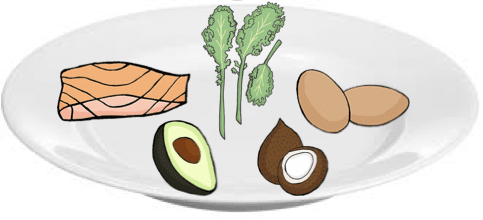
Is a Ketogenic Diet Right For You?
It’s my job to be savvy on the latest diet crazes and the latest nutritional research that hits the pike. It’s a lot to juggle, but it’s what you keep me around for, right? I love what I do, and it’s always my pleasure to bring you the freshest information around.
Every once in a while, a diet program captures my attention more than the others that hit the news waves. And that’s the case with the ketogenic diet plan.
The idea was first tossed on my lap when the gloriously energetic and wonderful human being Jimmy Moore had me on his top ranked iTunes health podcast “The Livin’ La Vida Low-Carb Show.” We had a chat about nutritional ketogenics and about Jimmy’s new book called Keto Clarity. He opened my eyes and ears with one word: Results. When I researched that these results were accompanied by great health and kept you looking spectacular, I was listening.
A ketogenic diet is designed to boost your body’s ability to burn fat through nutritional ketosis. You’ll eat more fat, moderate amounts of protein and lower amounts of carbohydrates.
One of the advantages of nutritional ketosis: Reduced hunger. By eating more fat, you will stabilize your blood sugar and cut your cravings.
Numerous studies have been conducted to highlight the benefits, including:
Researchers studied obese individuals who followed a ketogenic diet for a longer period of time than before. They found that patients lost significant amounts of weight while improving their cholesterol levels. (Source)
Researchers evaluated low calorie diets versus low carb ketogenic diets for people with diabetes. They found that patients improved in terms of their blood sugarwhile losing weight. (Source)
Researchers compared low fat diets to low carb diets. They discovered that the benefits of very low carb diets (ketogenic) were much greater. (Source)
Here are some common questions on Nutritional Ketosis that I get asked in practice:
What happens to our body during the ketogenic diet?
A ketogenic diet is a way for us to get our bodies into what’s called a “state of ketosis”. Since this diet plan is restricting the amount of carbohydrates entering the body, the liver begins to produce ketones which supercharge your body to utilize fat.
When in this state, ketone levels in our blood begin to rise, and blood acidity can increase rapidly (which can have a serious effect on your liver, kidneys, and urine).
Doc, that sounds horrible! Why would anyone in their right mind implement this sort of weight loss diet?
Well, fear not. When implemented responsibly (and correctly) the ketogenic diet can actually treat a wide variety of health conditions!
On a keto diet, a person typically caps their carbohydrate intake at around 50-60g per day. These carbs should come from healthy foods like vegetables. Refined carbohydrates (such as cereals, bagels, pasta, etc) should be avoided.
What will I be eating?
A ketogenic diet menu includes healthy fats (coconut oil fats and oils, avocado, etc) and protein (chicken, turkey) should make up for the bulk of your food consumption. A well-known rule to follow is what’s called “60/35/5” which equates to the following.
– 60 – 70% of your calories come from healthy fat
– 25 – 35% of your calories come from protein
– 5 – 10% comes from carbs
Anything I have to watch out for when eating this way?
Don’t go overboard on the protein! This could potentially prevent your body from entering a ketosis state, which means all of your work will be for nothing.
But, I like eating Paleo! Can I combine the two? Paleo plus Keto?
The benefits of a Paleo low carb diet range from improved energy to clearer skin. But what if you’re trying to lose weight and have reached a plateau, or are only losing ¼ of a pound or less each week and want to speed up your weight loss safely?
To supercharge Paleo plus Nutritional Keto, try this:
Keep your total carbohydrates between 10 to 50 grams daily, such as leafy green vegetables, mushrooms and asparagus
Maintain your diet high in fats by eating Paleo friendly fats, such as avocado, nuts and coconut oil.
No high protein, but smart healthy amounts from protein sources, such as beef, chicken and fish, equal to .7 to .9 grams of protein per pound of body weight.
You have got me interested Doc… How do I learn more?
Get Jimmy’s book and check out his show!
Keep thinking big and living bold!
-Dr. Kellyann






